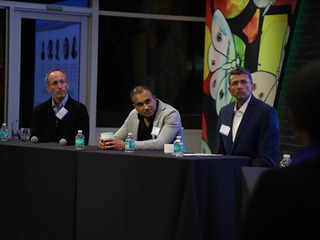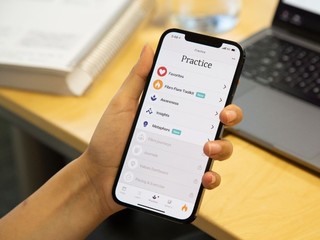Perseverance: From running out of money to an IPO - StubHub comes back strong
In the post-Covid drive for live events, ticket platforms are jumping at the opportune market time
Read more...Whether it’s skipping the line at your pharmacy, getting 24/7 access to virtual support, recapping what the doctor said during a visit, or scoring game points for achieving health goals – a slew of innovative platforms sprang up to make that possible. Here are just a few verticals and respective players using digital health technology to improve medical patients’ wellbeing.

Skip the pharmacy or doctor appointment
Why waste time and get stressed over scheduling doctor appointments, connecting to a suitable pharmacy, and waiting in line when you can do everything online with platforms like Nurx? With its own medical team to write prescriptions and assign screening, the San Francisco-based company sells treatments and self-test kits and delivers them to your door, bypassing the pharmacy. With a goal of no less than revolutionizing primary care, Nurx delivers products including birth control, psoriasis and eczema creams, HIV prevention pills, Covid-19 tests, mental health drugs, and UTI treatments.
Somewhat similar to Nurx was NowRX – unfortunately, the once-promising startup valued at $275 million in mid-2022 shut down by the end of the same year. Two virtual pharmacies also worth noting here, Capsule and Alto Pharmacy, took over NowRX’ patients to provide same-day drug delivery.
And there is a slew of telehealth-slash-online pharmacies, though the conditions treated via an online consultation are limited. To name a few, there’s Lemonaid telehealth, acquired by 23andMe, and there’s Express Scripts for existing prescriptions. You can treat migraines with Cove and discreetly get sexual healthcare with Wisp. For anxiety and depression, consider Cerebral. And there are tons of services like BetterHelp for online therapy sessions.
Less writing = more patient care
This story wouldn’t be complete without generative AI. While its acceptance in medicine may be somewhat slower than in other applications due to patient safety concerns, ChatGPT-like note platform Abridge is already in use. This app records patient-doctor communication and helps generate clinical documentation, saving physicians the paperwork burden, keeping all the medical details noted, and reducing that physician burnout.
Abridge also operates an app linking to the patients. Thanks to this software, patients can actually return to what the doctor has said during the visit – with any medical terminology converted to plain English.
Similar to Abridge, less the patients’ app, is the SF-based Ambience AutoScribe. Here’s some info from the startup’s website: urgent care clinicians increase patient throughput by up to 50% with Ambience; geriatrists increase panel size by 33% or more; and psychiatrists go from 30 minutes to 4.5 minutes in documenting intro evaluation visits. Ambience is backed by some top investors including Andreessen Horowitz, Human Capital, AIX Ventures, and OpenAI Startup Fund.
Augmedix and Suki are two other medical note-taking platforms. Focus on human interaction while the technology will take care of the notes, proclaim the companies. There’s also Nuance, a Microsoft project. Already, according to the website, Nuance is “used by 77% of hospitals and 10,000 healthcare organizations worldwide” and records “300 million patient stories each year.”
SaaS and play for health
Here’s a company that specializes in making that crucial SaaS technology for its life sciences partners.
360Medlink, with offices in Montréal, Paris, and NYC, develops software for digital health and digital medicines. Its specialization: Digital Therapeutics (DTx) and Software as Medical Device (SaMD). Its goal is delivering “personalized and accessible healthcare solutions” with a focus on underserved communities. 360Medlink is working with some of the world’s pharma giants including Bristol Myers Squibb, Amgen, and Novartis.
And the company said its products set a track record of demonstrated clinical benefits for patients in the areas of chronic and rare diseases.
Here’s just one example: in partnership with the Rhode Island Executive Office of Health and Human Services, 360Medlink built Tavie Red – a mobile application that uses gamification to boost physical and mental health for HIV patients. The app aims to improve linkage and retention in care, featuring interactive quests, treatment tracking and reminders, a CD4 and viral load charting tool, self-assessments, and personalized health coaching. The company website proclaims Tavie Red “The Ideal Treatment Companion for People Living with HIV.”
Speaking of games, Vancouver-based Ayogo Health is another healthcare technology company that develops patient engagement applications by using game mechanics. Ayogo is backed by Merck Global Health Innovation Fund and has partnered with AstraZeneca, having built the user interface for Fit2Me, a free custom fit support program.
Another game-oriented health technology developer is Providence-based Empath Labs (rebranded from Sproutel). Partnered with children hospitals, Empath uses robotics, data capture, and games to help change patient behavior with the so-called “clinical companions.” One of their projects is Rufus, the Bear with Diabetes – it’s a stuffed toy that comes with animated storybooks and a mobile app, through which children diagnosed with type 1 diabetes learn to care for Rufus by feeding him foods, checking his blood sugar, and administering insulin using the virtual medical tools.
Once again, these are just a few verticals of tech use in the medical space. There may be a "part 2" to this story at some point. And all these companies have one thing in common: their focus on making healthcare more humane by applying technology.
In the meantime, if you're thinking of launching your own healthtech startup but have no medical degree, check out MDisrupt, which I wrote about earlier this week. This platform can connect you to experts in the medical space that could help you through every stage of product development.
Images taken in part from: Express Scripts, Tavie Red, Empath Labs, Ayogo, Cerebral, 360Medlink
In the post-Covid drive for live events, ticket platforms are jumping at the opportune market time
Read more...EveryCure will leverage BioLogicAI, BioPhy’s predictive AI engine, to assess drug-disease matches
Read more...The contract will make it easier for state agencies to evaluate and implement Fusion's technology
Read more...



